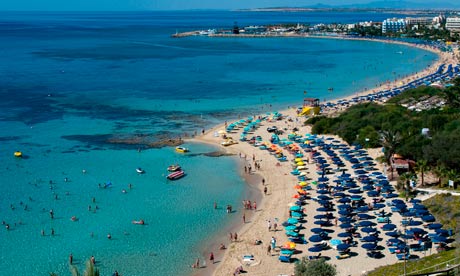
What do people do when popular uprisings, economic uncertainty and the vagaries of the British weather conspire to derail the best-laid summer plans? Revert to the old favourite Mediterranean destinations, it would seem.
Turmoil in the Middle East and ever-tightening purse strings are putting paid to the longer haul ambitions of thousands. And downpours across Britain are washing away staycations by the coachload. But from Ayia Napa to the Canary Isles the music is pumping and the beer is flowing: the Brits are back in town.
A surge in last-minute holiday bookings is reviving the fortunes of holiday hotspots that some may have snubbed in recent years. And it is cost-conscious British holidaymakers who are responsible for a late rush to places they once again view as offering safety, economy and familiarity.
Despite the demise of Holidays 4 UK, the Association of British Travel Agents has reported a notable leap in trade in recent weeks. Destinations such as Cyprus, Malta, Italy and Spain are once again thronging with sunseekers from the UK.
Concern over political and social upheaval continues to deter many of those who in the past may have considered the likes of Egypt, Morocco and Tunisia. Along with the old favourite destinations, adventure holidays, organised tours and all-inclusives are picking up the slack.
As the summer rush kicked in last week, lifting an otherwise rocky year for the industry, there were deals to be had. Independent holiday website Travelzoo registered more than 100,000 clicks on a cut-price £269 offer for an all-inclusive week in Corfu in September or October.
But that means there is still pressure on the travel agents. "It's a very turbulent and unstable time for the travel business," Joel Brandon-Bravo, managing director of Travelzoo, said.
"The Arab spring has had an effect and occupancies in Egypt, Tunisia and Morocco are at an all-time low.
"Egypt was at 20% occupancy. The response by Thomas Cook and TUI has been to reduce capacity and shift planes to other destinations. The public has gone for these sorts of destinations before and people are playing safe, we are talking about Spain, the Balearics and those sorts of places."
A survey carried by Travelzoo in June showed 45% of potential travellers had still to book holidays, with most shopping around or waiting for prices to drop. Those people appear to be making their move now. Downpours across the UK will have done little to convince them to spend their holiday cash at home. "People were playing a waiting game," Brandon-Bravo said. Lawrence Hunt, director of Low Cost Holidays, has watched his company benefit from a 57% year-on-year rise in business, putting it on track to arrange holidays for about 3.2million customers. Lanzarote and Fuerteventura in the Canary Islands are up 250%, with Egypt, unsurprisingly, down 10%.
Hunt attributes the rise only partly to the images of political turmoil created by the Arab spring, with fuel prices and passenger duty making the old sun and sangria destinations a more economical option.
Abta also reported a quiet start to the year, with the royal wedding keeping people at home during Easter, but that was followed by a subsequent 11% hike in bookings for Spain, 8% for Portugal and 2% for Greece.
Head of communications Victoria Bacon said: "We've been hearing reports that in the last three weeks or so there's been a notable upturn in business. One travel agent said he was rushed off his feet, he was literally flat out.
"People deliberately left it late so they could look for a bargain. Given the economic situation people are being more cost-conscious, but they still want a summer holiday. The danger is that while there are bargains out there, people risk missing out altogether because the capacity has gone."
Abta says that despite the collapse of Holidays 4 UK on Wednesday, ruining the plans of 50,000 holidaymakers, there have been 13 failures of companies registered with Atol – the Civil Aviation Authority's consumer safety net – so far this year, compared with 17 last year and 26 in 2009. Some reports, though, are now warning that many companies face a tough few months.
Travel agents point out that British holidaymakers are among the most resilient in the world, and have in the past been undeterred by corporate failures, natural disasters and terror attacks.

